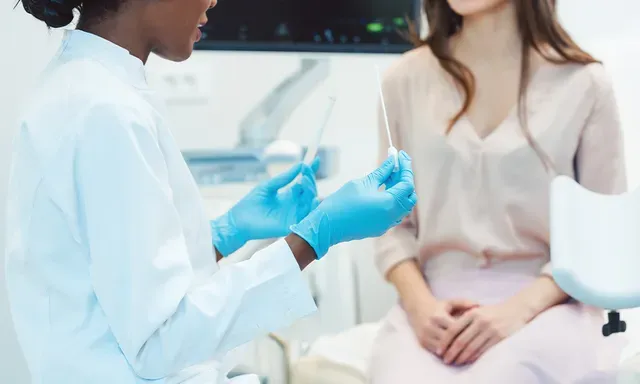STD Testing in Austin, TX

STD Testing and Treatment in Austin, TX
What is an STD?
An STD (sexually transmitted disease) is an infection that spreads between sexual partners. Common STDs include:
- Chlamydia
- Genital herpes
- Gonorrhea
- Viral hepatitis
- HIV/AIDS
- Syphilis
- Human papillomavirus (HPV)
HPV is a common infection that causes genital warts. It’s also the leading cause of cervical cancer. Older children and adults under the age of 45 can get vaccinated against HPV to protect them.
STDs can seriously affect your health and cause complications like pelvic inflammatory disease (PID) and infertility. Some cause severe illness and potentially life-threatening complications. STD testing at Women’s Health Domain helps prevent these devastating outcomes.
What symptoms do STDs cause?
Some STDs don’t cause any apparent problems, or you might get symptoms like a fever that you don’t connect to an STD. If you develop symptoms on your genitals, they could include:
- Redness
- Swelling
- Rash
- Discharge
- Itching
- Sores
- Warts
- Irritation
Some women bleed between periods, experience pain when urinating, or find sex is uncomfortable.
Because STDs don’t always cause symptoms, you might pass the infection on to your sexual partners without realizing it. Routine STD testing at Women’s Health Domain prevents infections from spreading and enables you to get any treatment you need.
When should I undergo STD testing?
If you’re sexually active, an annual STD screening test at Women’s Health Domain is advisable.
If you’re in a long-term relationship and neither of you has other sexual partners, your risk of STDs is low. However, if you have several sexual partners or take part in high-risk activities, your OB/GYN might recommend more frequent testing because your likelihood of contracting an STD is much higher.
You should also visit Women’s Health Domain for STD testing if you develop any symptoms or have been sexually active with someone who has an STD.
Screening tests for chlamydia and HPV involve swabbing your cervix to collect a cell sample, just like having a Pap smear to screen for cervical cancer.
What does STD testing involve?
STD testing might involve several different procedures. Urine and blood tests detect many STDs, and if you have a vaginal discharge or skin lesions, your OB/GYN might take a sample for lab testing.
Screening tests for chlamydia and HPV involve swabbing your cervix to collect a cell sample, just like having a Pap smear to screen for cervical cancer.
What happens after STD testing?
If STD testing shows you have an infection, your OB/GYN at Women’s Health Domain prescribes any treatment you need. Some STDs are incurable, though, so avoiding infection is the best approach to sexual health.
Condoms are the only effective protection against STDs, in addition to preventing unwanted pregnancy. Even if you’re using another form of birth control, you should always use a condom unless you and your partner are in a committed relationship.
To arrange expert STD testing, call Women’s Health Domain today or book an appointment online.
Top-Rated STD Testing & Treatment in Austin, TX
To arrange STD testing, call Women’s Health Domain or schedule an appointment online today.
OBGYN Services in Austin
Bilateral Salpingectomy
MonaLisa Touch
Perimenopause
Hot Flashes
Hormone Replacement Therapy
Natural Menopause Relief
Sexual Health After Menopause
